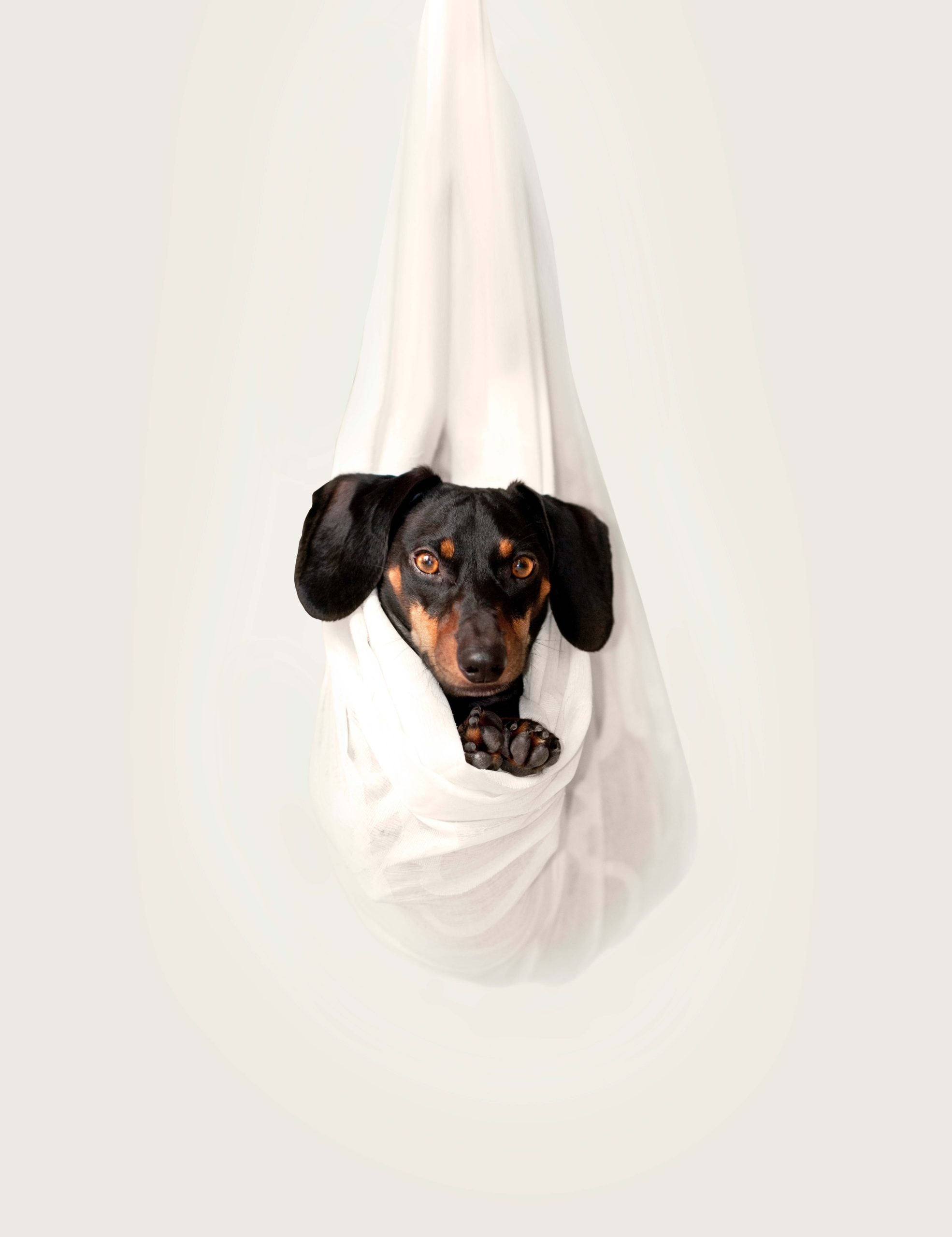
Dachshunds can make great pets and can have a surprising amount of energy despite sometimes being thought of as lap dogs. The American Kennel Club recognizes two different Dachshund sizes – the Standard Dachshund and the Miniature Dachshund. Both sizes can be prone to obesity so it’s important to know how much weight your Dachshund should ideally be carrying.
How big is a fully-grown Dachshund?

This answer will be different according to which breed size you are referring to. An adult Miniature Dachshund usually weighs less than 11 pounds and measures 5-6 inches in height. A dog’s height is measured from the ground to the top of its shoulder blades (also called the withers). An adult Standard Dachshund usually weighs between 16-32 pounds and measures 8-9 inches in height.
As you can see, there is quite a difference between the two breed sizes. Of course, individual dogs can also vary hugely, and many different factors can influence an adult dog’s size and weight including genetics, general health, diet, and exercise.
Weight Charts
These weight charts should give you a rough guide as to what your pup should weigh at each life stage, and whether or not they are growing at a healthy rate. Bear in mind that they are only guides and there can be huge variations in individual dogs. Veterinarians place a lot more emphasis on body condition score (BCS) than exact weight measurements. However, it’s still a good idea to know what your Dachshund should weigh at his ideal BCS.
Standard Dachshund Weight Chart
| Age | Minimum Weight (lbs) | Average Weight (lbs) | Maximum Weight (lbs) |
| 3 months | 7 | 10.5 | 14 |
| 6 months | 11 | 18 | 25 |
| 9 months | 14 | 22 | 30 |
| 12 months | 16 | 24 | 32 |
Miniature Dachshund Weight Chart
| Age | Minimum Weight (lbs) | Average Weight (lbs) | Maximum Weight (lbs) |
| 3 months | 5 | 5.5 | 6 |
| 6 months | 8 | 8.5 | 9 |
| 9 months | 10 | 10.5 | 11 |
| 12 months | 10 | 10.5 | 11 |
What if my puppy’s weight doesn’t match the weight chart?

If your puppy is not gaining weight, take them to the veterinarian to get them checked out, always better to investigate this sooner rather than later.
Bear in mind that puppies will grow at different rates and may have growth spurts – periods of time where they grow quickly, followed by a period of slower growth. Overall, a healthy Dachshund puppy who is being fed a quality diet that’s high in protein should gain weight steadily as they age. However, if your puppy is not gaining weight, or worse, is losing weight, then it is important to take them to the veterinarian to get them checked out. It is best to investigate sooner rather than later as a failure to gain weight can indicate a serious underlying health problem.
Why is my Dachshund puppy not gaining weight?

Parasites such as roundworm or giardia are common in puppies and can also be a reason for poor weight gain, as well as some other illnesses.
There are several reasons why your Dachshund puppy might not be gaining weight. It might be that their diet is of low quality with low protein content and not enough energy for a growing pup. Puppies should always be fed a good-quality diet that is appropriate to their age as puppies have very different nutritional requirements to adult dogs.
Parasites such as roundworm or giardia are common in puppies and can also be a reason for poor weight gain. You might also find your puppy has intermittent or prolonged diarrhea with these parasites. Sometimes health conditions such as congenital diseases or other illnesses can cause poor weight gain in puppies.
What should I do if my adult Dachshund is losing weight?
If your adult Dachshund is losing weight that isn’t intentional i.e., he is being fed high-quality dog food and he isn’t overweight and on a restricted diet, then you should take him to the veterinarian to get him checked. Weight loss can be a side effect of many different illnesses and diseases, some of which are more serious than others, so do not delay investigating your pet’s weight loss.
What should I do if my adult Dachshund is overweight?

Dachshunds are at risk of serious spinal conditions, and being overweight can make them even more prone to these.
Being overweight can make your dog prone to many different health conditions including, cancer, diabetes, heart disease, high blood pressure, and arthritis. In particular, Dachshunds are at risk of serious spinal conditions, and being overweight can make them even more prone to these. Ask your veterinarian or vet tech for advice on the best way to help your dog lose weight. It is important that they lose weight at the correct rate as losing weight too quickly can be detrimental to their health.
Summary
It’s important to monitor your Dachshund’s weight, not only while they are a growing puppy but also throughout their adult life. Unexplained weight loss in an adult dog, or failure to thrive as a puppy, could indicate a serious health problem, whilst being overweight can predispose your dog to serious health conditions. It is therefore very important to take your dog to the veterinarian if you are concerned about your Dachshund’s weight. Remember that these weight charts are just a guide and that as long as your Dachshund is happy and healthy, is being fed high-quality dog food, and has a good BCS, you needn’t worry too much about the exact number on the scales!
Frequently Asked Questions
How much should my Dachshund weigh?
The American Kennel Club states that an adult standard Dachshund should weigh between 16-32 pounds. An adult miniature Dachshund should weigh less than 11 pounds.
What are the 2 sizes of Dachshunds?
The 2 sizes of Dachshunds recognized by the American Kennel Club are the Standard Dachshund and the Miniature Dachshund.
What is overweight for a Dachshund?
Adult Dachshunds are considered to be overweight if their ribs are difficult to feel and they have no waist. Each individual dog will vary in size and therefore have a different ideal body weight so veterinarians use a Body Condition Score (BCS) to determine whether or not a dog is overweight.
How much should a 4-month-old mini-Dachshund weigh?
A 4-month-old mini-Dachshund should weigh between 6-8 pounds. This is only a guide and different puppies will grow at different rates so take your puppy to the veterinarian if you are concerned about their weight.



